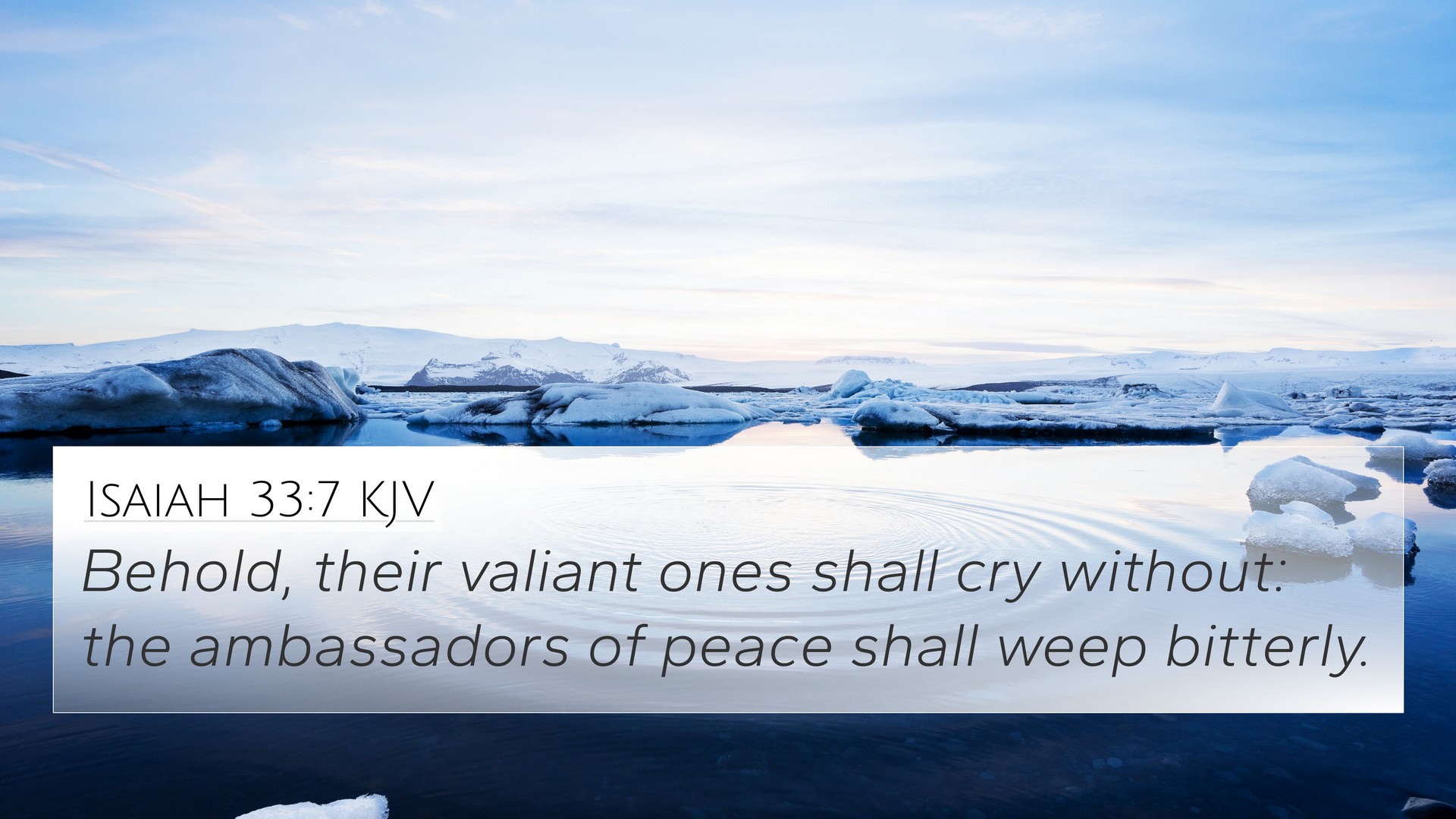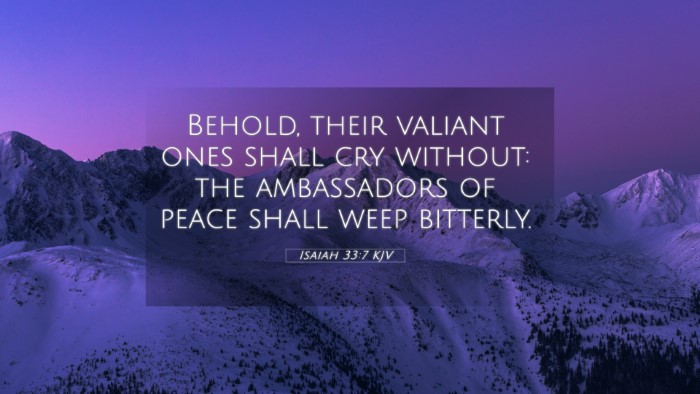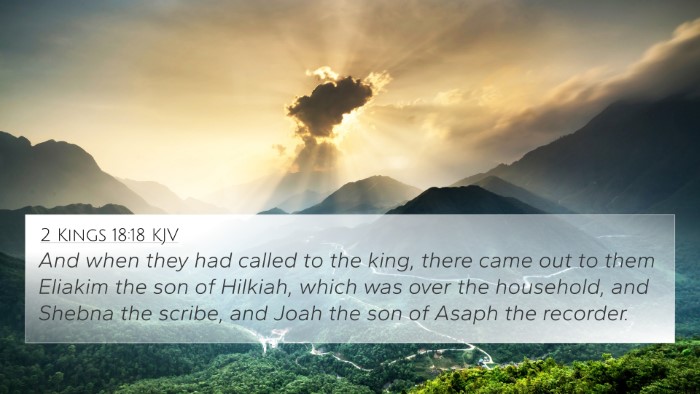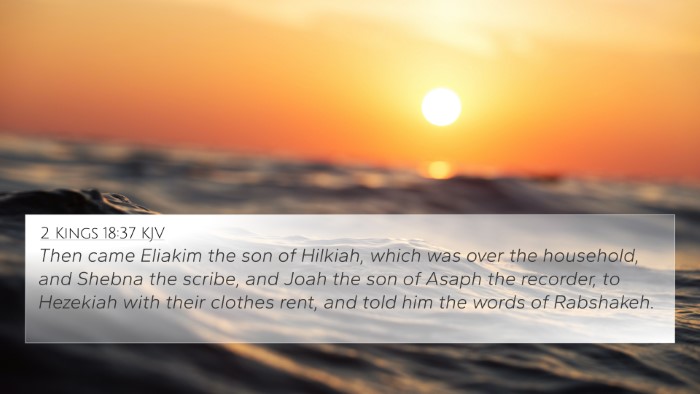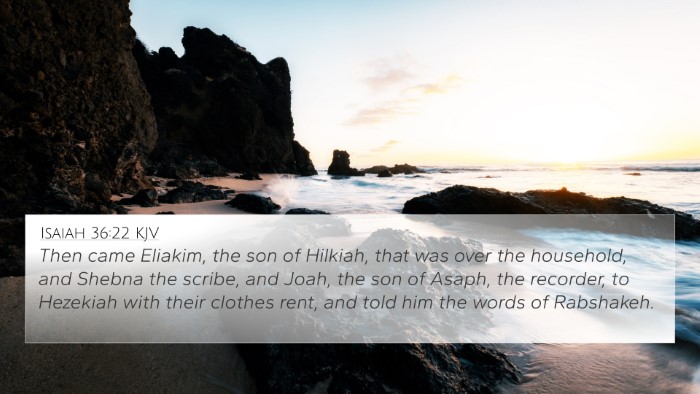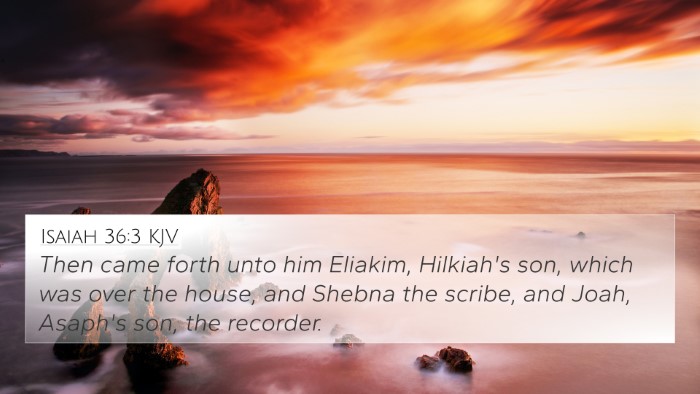Understanding Isaiah 33:7
Isaiah 33:7 states: “Behold, their valiant ones cry without; the ambassadors of peace shall weep bitterly.” This verse captures the somber reality faced by the prophets and ambassadors of peace during a time of turmoil and strife. It speaks to the emotional landscape in a period when trust is shattered, and hope feels fleeting.
Contextual Analysis
The passage is situated within a prophetic narrative that warns of impending judgment and the futility of reliance on human might versus divine sovereignty. The "valiant ones" represent those who were once courageous, now rendered helpless in the face of calamity.
Interpretation and Insights
- Matthew Henry's Commentary: Henry emphasizes the sorrow experienced by the ambassadors of peace, contrasting their previous roles in promoting harmony with their current state of despair. This reflects a broader theme of loss—a loss of peace, stability, and faith in human leadership.
- Albert Barnes' Notes: Barnes connects this verse to the consequences of spiritual unfaithfulness, underscoring that leaders who fail to align with God's will will ultimately lead their people into anguish. The crying of the ambassadors symbolizes the gravity of their context and urges a return to reliance on divine providence.
- Adam Clarke's Commentary: Clarke articulates the emotional weight of the verse, drawing comparisons to historical instances when Israel faced invasions. He notes that ambassadors, typically tasked with peace negotiations, find themselves lamenting as their efforts have come to naught, illustrating the futility of diplomacy without divine backing.
Thematic Connections and Cross References
Isaiah 33:7 can be linked to several other verses that emphasize similar themes of despair among leaders and the consequences of straying from God’s guidance:
- Isaiah 9:15: “The ancient and honorable, he is the head; and the prophet that teacheth lies, he is the tail.” This connects the failures of leadership and false prophecy with the resulting judicial actions of God.
- Jeremiah 14:2: “Judah mourneth, and the gates thereof languish; they are black unto the ground; and the cry of Jerusalem is gone up.” This parallels the lamentation in Isaiah 33:7, showing the collective suffering of God’s people.
- Lamentations 1:1: “How doth the city sit solitary, that was full of people! how is she become as a widow!” This reflects on the complete overturning of a once-thriving community, much like the context surrounding Isaiah's message.
- Micah 3:5: “Thus saith the Lord concerning the prophets that make my people err, that bite with their teeth, and cry, Peace; and he that putteth not into their mouths, they even prepare war against him.” A similar theme of false peace is found here related to the inadequacy of leadership.
- Ezekiel 13:10: “Because, even because they have seduced my people, saying, Peace; and there was no peace.” This reflects the disparity between the promises of peace and the realities of war, echoing the sentiments in our target verse.
- Isaiah 59:8: “The way of peace they know not; and there is no judgment in their goings.” This emphasizes the absence of true peace in times of sin and rebellion against God.
- 2 Kings 25:3: “And on the ninth day of the fourth month the famine prevailed in the city, and there was no bread for the people of the land.” This historical narrative provides context for the dire conditions that lead to despair as noted in Isaiah.
Comparative Analysis with Other Biblical Themes
Cross-referencing Isaiah 33:7 with themes of divine judgment and the fragility of human authority can lead to a deeper understanding of how God guides history according to His perfect will. This verse and its connections point to the vital importance of peace rooted in the fear of the Lord rather than mere diplomatic efforts.
Exploring Biblical Interconnections
Understanding the sentiments within Isaiah 33:7 paves the way for examining how peace, righteousness, and leadership are interwoven throughout scripture. Observing the cry of the ambassadors becomes a universal reminder of the consequences faced when straying from God's path.
Resources for Deeper Study
For those interested in exploring Bible cross-referencing and the interconnectedness of scriptural themes, consider these tools:
- Bible concordance
- Bible cross-reference guide
- Cross-reference Bible study methods
- Comprehensive Bible cross-reference materials
- Bible reference resources
- Bible chain references
Conclusion
Isaiah 33:7 serves as a poignant reminder of the struggles faced by leaders striving for peace in tumultuous times, and the necessity for alignment with divine guidance. By examining related verses and themes, one can gain insights into the broader biblical narrative illustrating the importance of genuine peace that comes from God.
